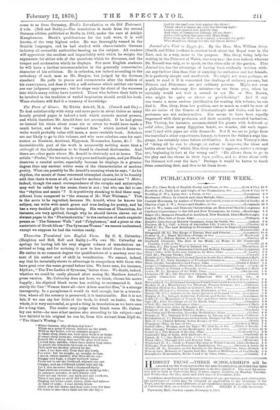neocritus Translated into English Verse. By C. S. Calverley. (Deighton
and Bell, Bell and Daldy.)—We owe Mr. Calverley an apology for having left his very elegant volume of translations un- noticed so long, and for noticing it now in less detail than it deserves. He unites in no common degree the qualifications of a mastery over the text of his author and of skill in versification. We cannot, indeed, say that he invariably shows to advantage in comparison with those who have gone over the same ground before him. We have seen, for instance, Idyll xv., "The Two Ladies of Syracuse," better done. We doubt, indeed, whether we could be easily pleased after seeing Mr. Matthew Arnold's prose version. Mr. Calverley does not here, we think, choose his metro happily ; his slipshod blank verse has nothing to recommend it. And surely the line "Women know all—how Adam married Eve," is a strange incongruity. In a paraphrase it would do well enough, but in a transla- tion, where all the scenery is preserved, it is inadmissible. But it is not fair, if we can say but little of the book, to dwell on faults. On the whole, it is very successful, as good a thing in translation as we have seen for a long time. The reader may judge what blank verse Mr. Calver- ley can write—he uses other metres also according to his subject—and how faithful to his original he can be, from this extract from Idyll xi., -" The Giant's Wooing :"— " White Galatea, why disdain thy love ?
White as a presa'd cheese, delicate as the lamb, Wild as the heifer, soft as summer grapes If sweet sleep chain me, here thou wariest at large, If sweet sleep loose me, straightway thou art gone, Scared like a sheep that sees the gray wolf near. I loved thee, maiden, when thou cam'st long since, To pluck the hyacinth-blossom on the fell, Thou and my mother, piloted by me. I saw, I see thee still, from that day forth, For ever; but 'Us nought, ay, nought, to thee. I know, sweet maiden, why thou art so coy: Shaggy and huge, a single eyebrow spans From ear to ear my forehead, whence one eye
Gleams, and en o'crbroad nostril tops my lip.
Yet I, this monster, feed a thousand sheep That yield me sweetest draughts at milking-tide; In summer, autumn, or mid-winter, still Falls not my cheese ; my milk-pail aye o'erflows. Then I can pipe as ne'er did Giant yet, Singing our loves—ours, honey, thine and mine— At dead of night ; I rear eleven hinds
(Each with her fawn) and bear cabs four, for thee. Oh come to me—thou shalt not rue the day—
And let the mad seas beat against the shore 'Twere sweet to haunt my cave the livelong night :
Laurel, and cypress tall, and ivy dun,
And vines of sumptuous fruitage, all are there : And a cold spring that pine-clad &ma flings, Down from the white snow's midst, a draught for gods! Who would net change for this the Ocean waves ?"


































 Previous page
Previous page